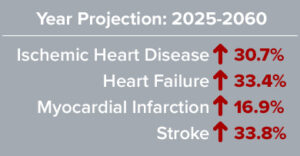The 7 biggest challenges to your heart health and what you can, or can’t, do about them.
When I heard that my requested topic for this first SAB blog of 2023 was “Heart Health” I was excited. But then I realized the scope of the challenge… say something meaningful in a brief blog. Tough, especially considering the SAB and NeoLife have published important, leading edge, science-backed articles on heart health for decades, often well before mainstream science and medicine got on board.
According to the US Centers for Disease Control and Prevention (CDC) there are seven primary causes of heart disease.1 Three we can do little about; age, gender, and family history (genetics). Three are purely lifestyle that we could do something about: smoking, lack of physical activity, stress.
But the big one, the 7th, that is consistent across all of that is UNHEALTHY DIET. It is even implicated in other “causes” of heart disease, like high blood pressure, high cholesterol, high blood sugar, obesity and type-2 diabetes: all diet driven risk factors.
Heart health is a BIG topic
The heart is an amazingly complicated organ that moves blood around the body, delivering oxygen, nutrients and bioactive substances while removing carbon dioxide and metabolic waste. Not surprisingly there is a ton of data available on the topic. Type “Heart Health” into the Google search bar and you’ll get something like 8,220,000,000 results.
To narrow that down I decided to focus my article on inflammation; in particular, “diet-related, low-grade inflammation and heart health,” the reality that too many people unknowingly live with. For decades mainstream cardio-science focused almost exclusively on the idea that excess cholesterol was the only important factor in atherosclerosis and heart disease. It’s true that cholesterol control is important, but about half of all cardiac deaths are in people without elevated cholesterol. That remains true still today.
We’ve known about the “inflammation connection” for decades
As far back as the early 1990’s the SAB, along with many forward-thinking scientific minds such as those at the Scripps Conferences, Linus Pauling Institute, Experimental Biology events and others we attended and participated in, were already pointing to the “oxidation and inflammation” connection as a cause.
One name that stood out was Paul Ridker, Cardiologist and Epidemiologist at Brigham and Women’s Hospital in Boston. Dr. Ridker’s proposal to look for an inflammation connection was largely regarded as naïve and off point. His ideas however were eventually accepted and are credited with being a turning point in thinking. Today inflammation is broadly accepted as a driver of heart disease.
Even with all the research the trend lines for heart disease doesn’t look good
The idea that our diets contain both heart “protectors” and heart “attackers” (no pun intended) seems obvious, but many people either don’t know that or lack the desire to do anything about it. As a result, heart disease remains the leading cause of death around the world. Sadly, that’s expected to get worse, increasing significantly from now to 2060 according to recent studies published by the American College of Cardiology.
Figure 1. Projections of cardiovascular disease in the US from 2025-2060.




